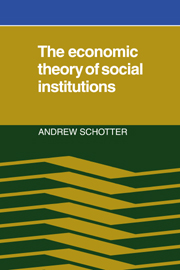Crossref Citations
This Book has been
cited by the following publications. This list is generated based on data provided by Crossref.
1981.
ERHALTENE BÜCHER - LIVRES REÇUS BOOKS RECEIVED.
Kyklos,
Vol. 34,
Issue. 3,
p.
504.
Berman, S. M.
and
Schotter, A.
1982.
Games, Economic Dynamics, and Time Series Analysis.
p.
127.
Long, Samuel
1982.
Political Science Abstracts.
p.
1.
Roweis, S T
1983.
Urban Planning as Professional Mediation of Territorial Politics.
Environment and Planning D: Society and Space,
Vol. 1,
Issue. 2,
p.
139.
Barlow, George W.
and
Rowell, Thelma E.
1984.
The contribution of game theory to animal behavior.
Behavioral and Brain Sciences,
Vol. 7,
Issue. 1,
p.
101.
Frey, Bruno S.
1984.
The function of governments and intergovernmental organizations in the international resource transfer — The case of the World Bank.
Weltwirtschaftliches Archiv,
Vol. 120,
Issue. 4,
p.
702.
Rapoport, Anatol
1984.
Game theory without rationality.
Behavioral and Brain Sciences,
Vol. 7,
Issue. 1,
p.
114.
Johnston, Timothy D.
1984.
Development and the origin of behavioral strategies.
Behavioral and Brain Sciences,
Vol. 7,
Issue. 1,
p.
108.
Fararo, Thomas J.
and
Skvoretz, John
1984.
Institutions as production systems.
The Journal of Mathematical Sociology,
Vol. 10,
Issue. 2,
p.
117.
Heckathorn, Douglas D.
1984.
Mathematical theory construction in sociology: Analytic power, scope, and descriptive accuracy as trade‐offs*.
The Journal of Mathematical Sociology,
Vol. 10,
Issue. 3-4,
p.
295.
Malone, John C.
1984.
Evolutionary game theory: Suddenly it's 1960! (or is it 1860?).
Behavioral and Brain Sciences,
Vol. 7,
Issue. 1,
p.
112.
Blanchard, D. Caroline
Blanchard, Robert J.
and
Flannelly, Kevin J.
1984.
Cost-benefit analysis: An emotional calculus.
Behavioral and Brain Sciences,
Vol. 7,
Issue. 1,
p.
103.
Ruttan, Vernon W.
and
Hayami, Yujiro
1984.
Toward a theory of induced institutional innovation.
The Journal of Development Studies,
Vol. 20,
Issue. 4,
p.
203.
Thaler, Richard H.
1984.
Asymmetric games and the endowment effect.
Behavioral and Brain Sciences,
Vol. 7,
Issue. 1,
p.
117.
Rachlin, Howard
1984.
Learning rules and learning rules.
Behavioral and Brain Sciences,
Vol. 7,
Issue. 1,
p.
113.
Einhorn, Hillel J.
1984.
Random strategies and “ran-dumb” behavior.
Behavioral and Brain Sciences,
Vol. 7,
Issue. 1,
p.
104.
Gilbert, Margaret
1984.
Coordination problems and the evolution of behavior.
Behavioral and Brain Sciences,
Vol. 7,
Issue. 1,
p.
106.
Krebs, John R.
and
Kacelnik, Alejandro
1984.
Optimal learning rules.
Behavioral and Brain Sciences,
Vol. 7,
Issue. 1,
p.
109.
Fararo, Thomas J.
1984.
Evolutionary game theory and human social structures.
Behavioral and Brain Sciences,
Vol. 7,
Issue. 1,
p.
104.
Logue, A. W.
1984.
Is it possible to be optimal?.
Behavioral and Brain Sciences,
Vol. 7,
Issue. 1,
p.
111.





